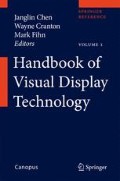Abstract
Autostereoscopic displays show stereo 3D without the need for spectacles. The simplest show the same pair of views as a stereoscopic display and make them visible each to one eye with lenslets, barriers, or something similar. The more advanced displays are such that what the user sees depends on their point of view and this is done by presenting many views, tracking the head of the viewer, or both. If the angle between views is sufficiently fine, autostereoscopic displays look like holograms except for the slight blurring caused by random phase between pixels. This chapter presents an overview of established and emerging autostereoscopic systems.
Access this chapter
Tax calculation will be finalised at checkout
Purchases are for personal use only
References
Travis ARL (1997) The display of three-dimensional video images. Proc IEEE 85:1817–1832
Lippmann MG (1908) Epreuves reversibles donnant la sensation du relief. J Phys 7:821–825
Okano F, Hoshino H, Arai J, Yayuma I (1997) Real time pickup method for a three-dimensional image based on integral photography. Appl Opt 36:1598–1603
Kim Y, Jung J-H, Hong K, Park G, Lee B (2010) 37.4: Accommodation response in viewing integral imaging. SID symposium digest of technical papers, vol 41, Seattle, May 2010, p 530–532
Hoffman DM, Girshick AR, Akeley K, Banks MS (2008) Vergence–accommodation conflicts hinder visual performance and cause visual fatigue. J Vis 8(3):33, 1–30
Schowengerdt BT, Seibel EJ (2005) 7.1: True 3D display technology. SID symposium digest of technical papers, vol 36, Boston, May 2005, pp 86–89
Cees Van Berkel C (1999) Image preparation for 3D-LCD. In: Proceedings of SPIE vol 3639, stereoscopic displays and virtual reality systems VI, San Jose, pp 84–91, May 1999
Im H-j, Jung S-m, Lee B-j, Hong H-k, Shin H-h (2008) 20.1: Mobile 3D displays based on a LTPS 2.4 VGA LCD panel attached with lenticular lens sheets. SID symposium digest of technical papers, vol 39, Los Angeles, p 256–259
Woodgate GJ, Harrold J (2003) LP-1: High efficiency reconfigurable 2D/3D autostereoscopic display. SID symposium digest of technical papers, vol 34, Baltimore, pp 394–397
de Zwart ST, IJzerman WL, Dekker T, Wolter WAM (2004) A 20” switchable auto-stereoscopic 2D/3D display. In: Proceedings of 11th international display workshop (IDW), Niigata, pp 1459–1460
Hiddink MGH, de Zwart ST, Willemsen OH, Dekker T (2006) 20.1: Locally switchable 3D displays. SID international symposium digest of technical papers, vol 37, San Francisco, pp 1142–1145
Ren H, Fox D, Wu S-T (2007) 62.1: Liquid crystal and liquid lenses for displays and image processing. SID symposium digest of technical papers, vol 38, Long Beach, pp 1733–1736
Kao Y-Y, Huang Y-P, Yang K-X, Chao PCP, Tsai C-C, Mo C-N (2009) 11.1: An auto-stereoscopic 3D display using tunable liquid crystal lens array that mimics effects of GRIN lenticular lens array. SID symposium digest of technical papers, vol 40, San Antonio, June 2009, p 111–114
Moseley RR, Woodgate GJ, Jacobs AMS, Harrold J, Ezra D (2002) ‘Parallax barrier, display, passive polarization modulating optical element and method of making such an element’, US Patent 6437915
Eichenlaub JB, Hollands D, Hutchins JM (1995) A prototype flat plane hologram-like display that produces multiple perspective views at full resolution. In: Proceedings of SPIE vol 2409, stereoscopic displays and virtual reality systems II, San Jose, pp 102–112
Travis ARL (1990) Autostereoscopic 3-D display. Appl Opt 29:4341–4343
Travis ARL (1997) View-sequential holographic display. International Patent WO9900993, 1997
Ezra D, Woodgate GJ, Omar BA, Holliman NS, Harrold J, Shapiro LS (1995) New autostereoscopic display system. In: Proceedings of SPIE, vol 2409, stereoscopic displays and virtual reality systems II, San Jose, p 31
Brott R, Schultz J (2010) 16.3: Directional backlight lightguide considerations for full resolution autostereoscopic 3D displays. SID Symposium digest of technical papers, vol 41, Seattle, pp 218–221
Käläntär K, Matsumoto SF, Katoh T, Mizuno T (2004) Backlight unit with double-surface light emission using a single micro-structured lightguide plate. J SID 12:379–387
Travis ARL, Large T, Emerton N, Bathiche S (2009) Collimated light from a waveguide for a display backlight. Opt Express 17:19714–19719
Mo YG, Kim M, Kang CK, Jeong JH, Park YS, Choi CG, Kim HD, Kim SS (2010) 69.3: Amorphous oxide TFT backplane for large size AMOLED TVs. SID symposium digest of technical papers, vol 41, Seattle, pp 1037–1040
Koshida N, Dogen Y, Imaizumi E, Nakano A, Mochizuki A (2009) 45.2: An over 500 Hz frame rate drivable PSS-LCD: its basic performance. SID symposium digest of technical papers, vol 40, San Antonio, pp 669–672
Wilkinson TD, Crossland WA, Coker T, Davey AB, Stanley M, Yu TC (1997) The fast bitplane SLM: a new ferroelectric liquid crystal on silicon spatial light modulator. In: Spatial light modulators, technical digest. Optical society of America, Washington, pp 149–150
Sakai H, Yamasaki M, Koike T, Oikawa M, Kobayashi M (2009) 41.2: Autostereoscopic display based on enhanced integral photography using overlaid multiple projectors. SID symposium digest of technical papers, vol 40, San Antonio, pp 611–614
Baird JL (1942) Stereoscopic colour television. Wireless World 48:31–32
Travis ARL, Lang SR (1990) A CRT based autostereoscopic 3-D display. In: Eurodisplay 1990, 10th international display research conference, 26–28 September 1990, Amsterdam, LP10
Cossairt O, Møller C, Travis A, Benton SA (2004) Novel view sequential display based on DMD technology. In: Proceedings of SPIE vol 2591, stereoscopic displays and virtual reality systems XI, San Jose, pp 273–278
Møller CN, Travis AR (2005) Time multiplexed autostereoscopic flat panel display using an optical wedge. In: Proceedings of SPIE vol 5664, stereoscopic displays and virtual reality systems XII, San Jose, pp 150–157
Travis ARL, Møller CN, Lee CMG (2006) Flat projection for 3-D. Proc IEEE 94(3):539–549
Author information
Authors and Affiliations
Corresponding author
Editor information
Editors and Affiliations
Rights and permissions
Copyright information
© 2012 Springer-Verlag Berlin Heidelberg
About this entry
Cite this entry
Travis, A. (2012). Autostereoscopic Displays. In: Chen, J., Cranton, W., Fihn, M. (eds) Handbook of Visual Display Technology. Springer, Berlin, Heidelberg. https://doi.org/10.1007/978-3-540-79567-4_113
Download citation
DOI: https://doi.org/10.1007/978-3-540-79567-4_113
Publisher Name: Springer, Berlin, Heidelberg
Print ISBN: 978-3-540-79566-7
Online ISBN: 978-3-540-79567-4
eBook Packages: EngineeringReference Module Computer Science and Engineering

